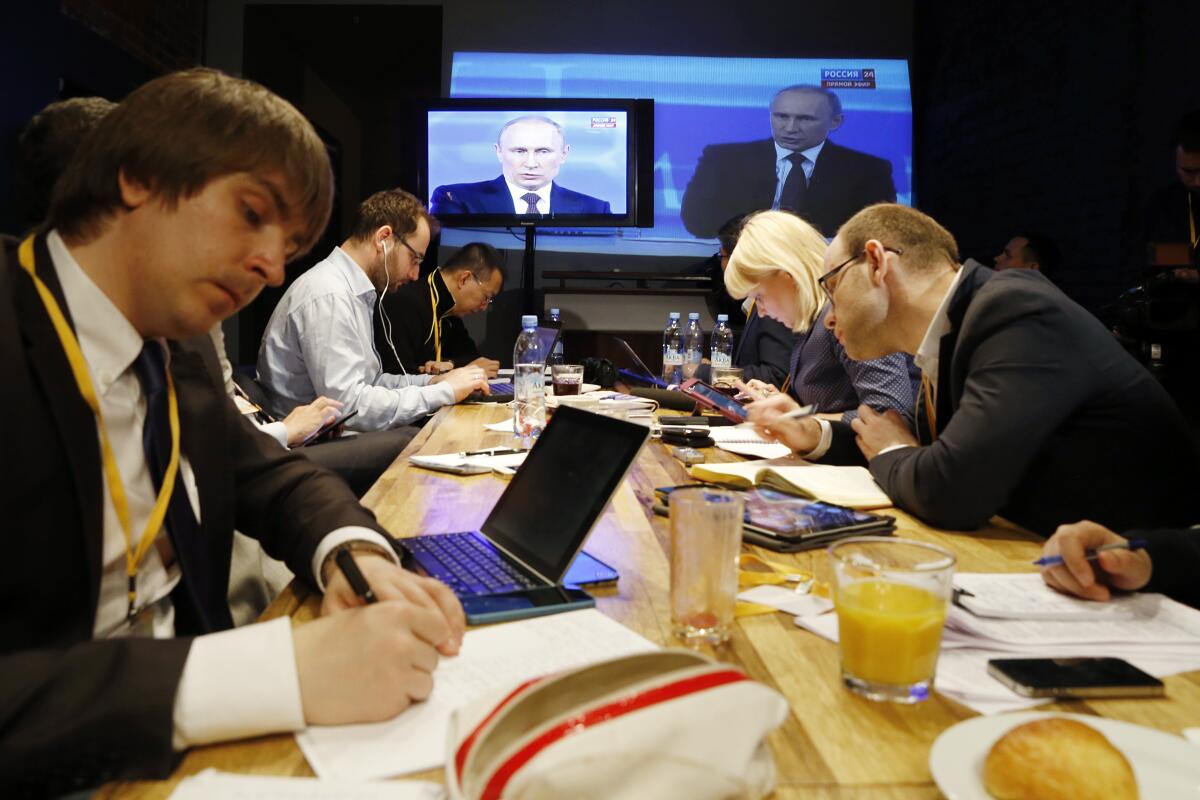Op-Ed: Keep foreign reporters in Russia despite the Kremlin’s crackdown

Back in 1992, when I first started working as a journalist in Moscow, government officials in newly post-Soviet Russia were delighted to speak with foreign reporters. Boris Yeltsin was an imperfect Russian president, but he allowed freedom of the press to flourish. That made the 1990s a vibrant time to be an international journalist in Russia, chronicling its transition out of communism.
Today, the situation for foreign reporters is exactly the opposite. Some news organizations, including the New York Times and Bloomberg News, are pulling all their correspondents out of Russia because of its new law cracking down on freedom of speech, which took effect Saturday. The new law criminalizes spreading false information about Russia or contradicting Russia’s official statements on the war in Ukraine. It prohibits journalists from using words like “war” or “invasion” to describe the conflict, which Russia has dubbed a “special military operation.” Anyone violating the law can be sentenced to up to 15 years in prison.
The new law is vague, giving the Russian state great leeway to apply it to both journalists and average citizens using social media. Russian parliamentarians and President Vladimir Putin did not seem to care that it contradicts the explicit guarantee of freedom of speech enshrined in the Russian Constitution. The current situation harks back to Soviet times, when foreign correspondents faced harassment, arrest or expulsion for their work, and regular Russians had to share information surreptitiously.
Despite the danger posed by this awful law, U.S. news outlets have a duty to keep their reporters in Russia — even if they cannot be on the air or put their names on stories. Many news outlets, including CNN, ABC and CBS, have announced that they will stop broadcasting into or from Russia, but have not said they are ordering their non-Russian employees to leave the country.
Documenting the Russian side of the war in Ukraine requires that foreign reporters stay put, at least for now. International journalists are creating the historical record of the Russian side of the conflict, and they’re providing an alternative to the pro-Putin propaganda that dominates the Russian media landscape on television and in print. Even if the new law prevents foreign reporters from publishing, they can still contribute information to colleagues outside Russia. The Western journalists still on the ground have contacts with whom they can interact, albeit carefully, and the ability to move around to gather information. Reporting from afar is just not the same.
To stay informed from my perch in New York City, I watch the Russian national news and speak to friends in Moscow nearly every day. But I’m missing a lot because I’m not there and unable to talk with a broad range of Russians outside a small circle of educated, liberal Russians.
It’s clear that Russian officials want to silence any criticism. But they could have ordered foreign reporters out of the country entirely if they wanted to — but they haven’t. I suspect they do want foreign coverage, if it’s sympathetic to their point of view.
Russian officials misguidedly think their law will stop the flow of information about the war inside Russia. It won’t. The law may drive a lot of the internal dissent underground and induce some of the foreign press to pack up shop. But the truth always gets out.
Fortunately, even when international news organizations pull their employees out of Russia, their bureaus have Russian staff who could remain in place. These excellent translators and reporters are the bedrock that underlies the coverage we see every day. Without them, the departure of American and other Western journalists would be far more devastating. But by doing their job, these locals are putting themselves at significant risk.
Certainly, social media and smartphones provide amazing opportunities to gather and disseminate information. Ukrainians have already uploaded thousands of videos showing the damage being done by Russian attacks, and Ukrainian President Volodymyr Zelensky has used social media brilliantly to build resistance to the war at home and abroad. Yet social media cannot make up for the loss of traditional journalists, in part because it can be so easily used for disinformation.
Professional journalists also compile the big picture from the mosaic of individual incidents. They analyze. They question. They add context.
I hope foreign reporters stay. After a break of a few days, the BBC is once again airing pieces from Moscow. Each word seems carefully crafted. The Washington Post is among the organizations keeping its American staff in Russia, for now, although it has removed bylines from some of its stories. This suggests there may be ways to get around the new law.
With the Russian media almost completely under the thumb of the Kremlin, it is up to foreign journalists to document and report what is happening on the ground. The American and other foreign reporters staying in Russia may be taking a risk, but they are providing a crucial service to the world and the Russian people simply by reporting the truth.
Beth Knobel is an associate professor of communication and media studies at Fordham University in New York. She spent 14 years as a journalist in Russia, contributing to the Los Angeles Times and serving as Moscow bureau chief for CBS News. @bethknobel
More to Read
A cure for the common opinion
Get thought-provoking perspectives with our weekly newsletter.
You may occasionally receive promotional content from the Los Angeles Times.










